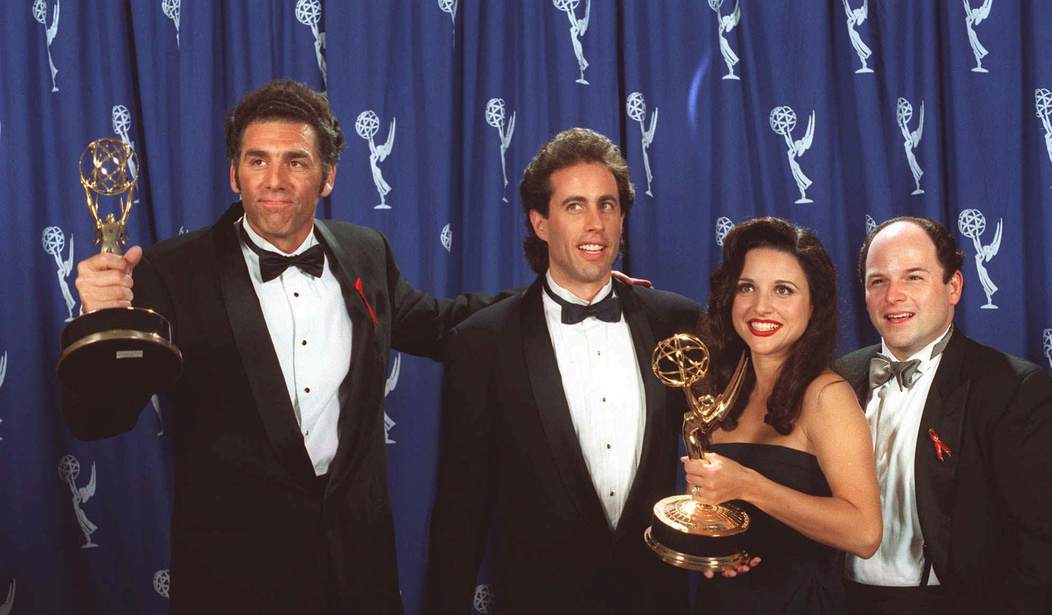Let me just get this out of the way upfront: I love “Seinfeld,” having probably seen every episode at least thrice.
For a “show about nothing,” the writing is phenomenal, the acting is great, and the gags are hilarious. George is the ultimate neurotic, compulsive liar; Kramer is delightfully eccentric and a master of physical comedy; Elaine is a nice female complement to the ensemble; Seinfeld is as much of a “straight man” character as you can get from a show like this.
What sets Seinfeld apart from virtually any other sitcom, among other things, is its total lack of moralizing. There are never any lessons taken away by any of the characters at the end of the show as at some point became a cliché of the genre.
Related: On the Spiritual Decay of Consumption-Centered, Individualistic Culture
Returning to the “show about nothing” point, in Season 4, Seinfeld and George pitch a show to NBC, which is actually the show itself (there are lots of meta-references throughout the sitcom; “look at all the junk that’s on TV,” George quips). In describing the show, George comes up with the “show about nothing” concept, which the network executives find intriguing.
The “show about nothing” motif has several layers.
First, the actual plotlines are almost all, except for fanciful and outlandish schemes cooked up by Kramer, about utterly mundane and, arguably, soul-crushing intricacies and grievances of daily life, like who gets due credit for buying the “big salad” for Elaine and the various excruciatingly minor flaws that Jerry finds in women he dates, such as “man hands.”
On another and more philosophical level, the “show about nothing” concept applies to the lack of any kind of character development or arc that plots usually center around. None of them ever improve or learn anything from their mistakes. At no point do any of them demonstrate a capacity for any higher emotion or ideals. There is no aspiration to anything better. There is only a black hole of meaning or purpose.
Personally — and it might be on account of my Irish heritage that I appreciate black humor so — the most hilarious moment in the whole show is when George’s fiancé, whom he has been desperately trying to figure out how to disentangle from for many episodes at that point, dies while licking cheap, toxic wedding invitation envelopes.
“Well, let’s get some coffee,” George says to close out the episode and walking nonchalantly out of the hospital.
Via Looper (emphasis added):
The show's co-creator, Larry David, had two simple rules for making "Seinfeld" episodes, namely "No hugging" and "No learning." It's an ethos you can see in every installment, as there aren't any sentimental moments where the friends come together to hug one another after a misunderstanding. They also never learn their lessons, often going through a comedy of errors to wind up being the same exact people by the episode's end.
In fact, David elaborated on this idea, once telling an interviewer, "A lot of people don't understand that 'Seinfeld' is a dark show. If you examine the premises, terrible things happen to people. They lose jobs; somebody breaks up with a stroke victim; somebody's told they need a nose job. That's my sensibility" (via The Atlantic). At their core, the four friends are awful people, as exhibited in Season 5's "The Hamptons" when Jerry (Jerry Seinfeld) and Elaine (Julia Louis-Dreyfus) meet a friend's new baby. They then proceed to call it "the ugliest baby" either one has ever seen.
Without looking a gift horse too close in the mouth, it might be worth stopping to consider why this kind of revelry in meaninglessness resonates with such a large audience.
It’s certainly representative of a unique genre of humor to the Western mind. The Thai mind, for instance — which I understand about as well as any alien can, which is not very and only superficially — would not appreciate Seinfeld in the same way. They do not have any real sense of irony or sarcasm cynicism or satire, at least not in the Western sense of those terms, nor are they afflicted with the kind of neuroticism that makes a character like George relatable.










